
Owner & Attorney - Atlanta Personal Injury Law Firm
This article has been written and reviewed for legal accuracy and clarity by the team of writers and legal experts at Atlanta Personal Injury Law Firm and is as accurate as possible. This content should not be taken as legal advice from an attorney. If you would like to learn more about our owner and experienced Georgia personal injury lawyer, Nathan Whittenburg, you can do so here.
Atlanta Personal Injury Law Firm does everything possible to make sure the information in this article is up to date and accurate. If you need specific legal advice about your case, contact us. This article should not be taken as advice from an attorney.
The information on this page is provided for general informational purposes only and should not be considered legal advice. Reading this content does not establish an attorney–client relationship.
Medical malpractice laws, including statutes of limitations and repose, are complex and can change. The application of these laws depends on the specific facts of each case.
You should consult a licensed attorney in your area for advice about your situation.
Contact Atlanta Personal Injury Law Firm – First Class for a free, no-obligation consultation with a Georgia medical malpractice lawyer to discuss your statute of limitations and other pertinent legal matters.
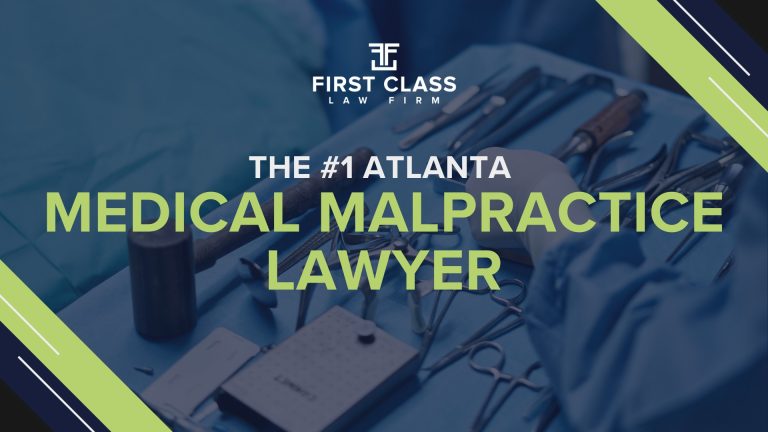
The Georgia medical malpractice statute of limitations is generally two years from the date the malpractice occurred.
This means an injured patient must begin legal proceedings within that time frame, or the claim will likely be barred.
Importantly, the clock runs from the time of the injury, not the date the negligent medical treatment was provided, though certain circumstances can extend or shorten this window.
If a death occurred as a result of malpractice, the two-year period is measured from the date of death rather than the original treatment.
A five-year statute of repose also applies, cutting off claims entirely after that period regardless of discovery.
Medical malpractice in Georgia is defined as harm caused when a medical professional fails to meet the accepted standard of care while providing treatment.
This includes errors in diagnosis, surgical mistakes, improper prescriptions, or failure to act when a reasonably competent provider would have.
Because the deadlines are strict and the rules technical, patients and families considering a claim must act quickly to preserve their rights.
If you or a loved one suffered harm because a medical professional provided negligent medical treatment in Georgia, you may be eligible to pursue legal proceedings for compensation.
Contact First Class – The Atlanta Personal Injury Law Firm for a free consultation.
You can also use the chat feature on this page to find out if you qualify for a medical malpractice lawsuit.
Medical malpractice claims in Georgia generally have a two-year statute of limitations, starting from the injury or death caused by negligence or wrongful acts.
Additionally, Georgia law sets a five-year statute of repose, which is an absolute deadline; no claim can be filed more than five years after the negligent act, regardless of when the injury was discovered.
These timelines generally apply to most adult medical malpractice cases.
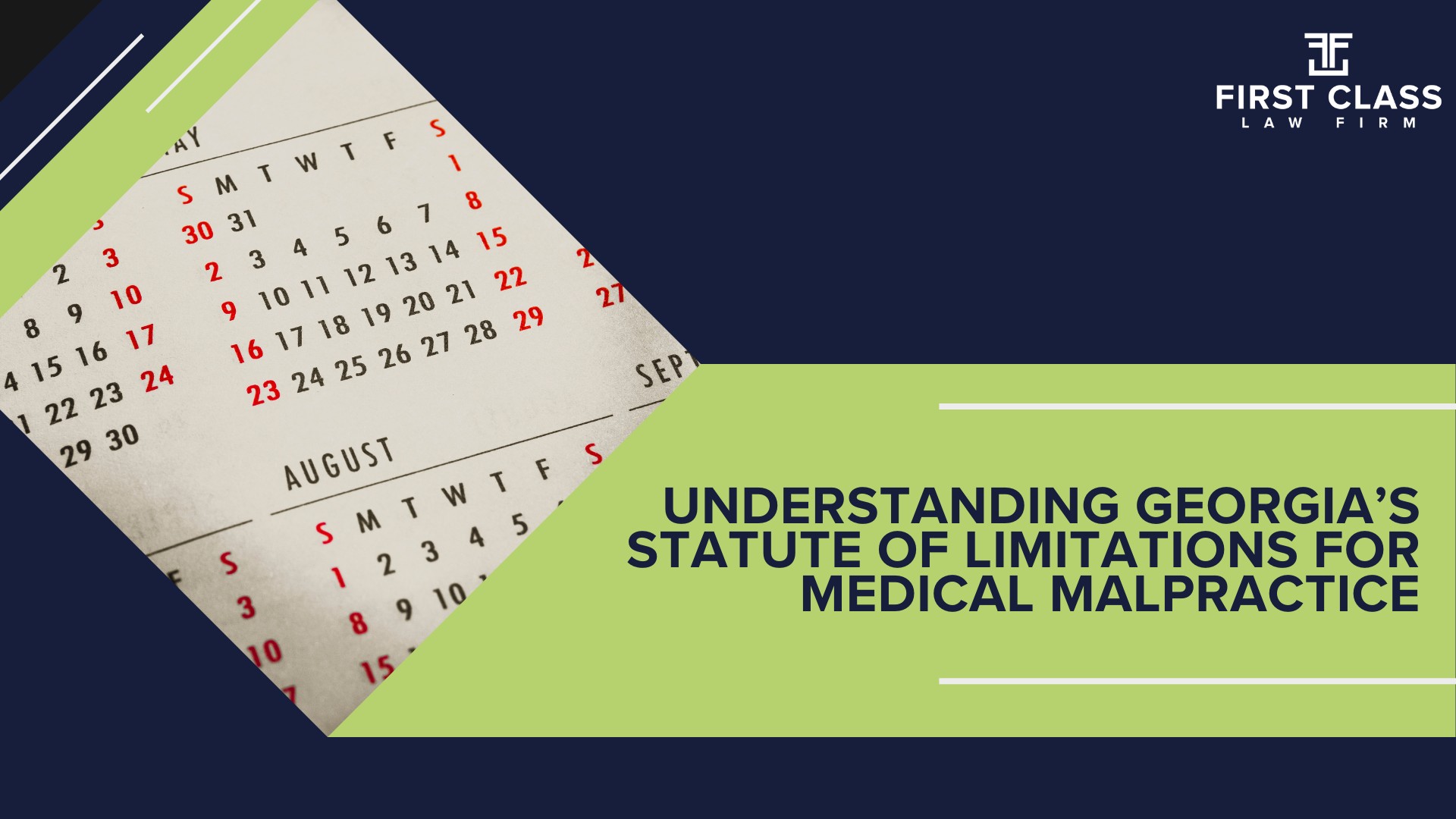
However, assessing applicability and spotting potential exceptions requires careful legal analysis.
For example, certain situations, such as discovering an injury that was previously unknown or specific tolling provisions, may influence these deadlines.
In most adult medical malpractice cases in Georgia, the statute of limitations starts on the date the injury occurred, as outlined in O.C.G.A. § 9-3-71(a).
This applies even if the patient was unaware of the injury at the time it happened.
However, Georgia law recognizes limited exceptions in which the date of discovery—the point at which the injury is first known or reasonably should have been known—may delay the start of the two-year limitations period.
This can occur in specific situations, such as cases involving foreign objects left in the body during surgery, where the harm might not be immediately detectable.
It’s important to note that even if the discovery rule applies, the five-year statute of repose usually acts as a strict limit.
This means that, regardless of when the injury is found, a lawsuit generally cannot be filed more than five years after the alleged negligent act took place.
Because of the legal focus on dates, both the injury occurrence and the discovery of harm, keeping accurate medical records and treatment timelines is crucial.
Medical documentation can be vital in establishing when an injury happened, how long it remained unnoticed, and whether a claim is within the filing period allowed by Georgia law.
Therefore, individuals who suspect they may have a malpractice claim should obtain copies of their medical records promptly. Reviewing this documentation with the help of legal and medical experts can clarify whether the statutory deadlines have passed or are still upcoming.
Along with Georgia’s two-year statute of limitations for medical malpractice claims, state law also sets a five-year maximum period for filing such claims, known as the statute of repose.
While the statute of limitations determines the time frame in which a claim must be filed after an injury occurs or is discovered, the statute of repose establishes a firm limit on how long a claim can be brought, regardless of when the harm is recognized.
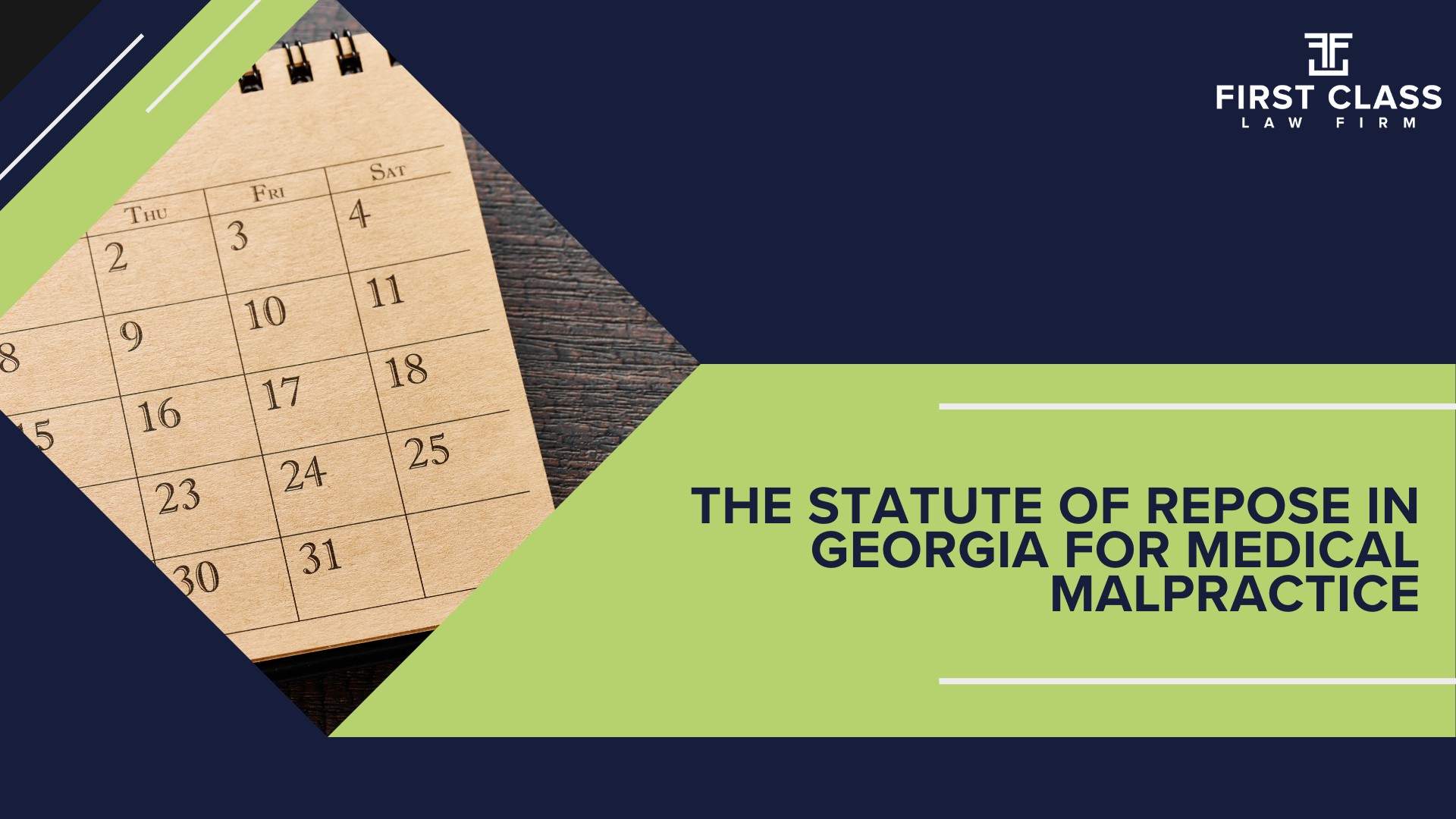
The statute of repose acts as a final cutoff date, different from the statute of limitations.
Its goal is to give closure to potential defendants by limiting the period during which they can be held liable.
This rule ensures that, even if an injury is discovered years later, a claim can’t be made indefinitely.
It helps prevent issues with litigating older claims, where evidence may be lost or difficult to find.
In Georgia, this rule is established under O.C.G.A. § 9-3-71(b).
The law states that no medical malpractice claim can be filed more than five years after the date of the act or omission that caused the injury, regardless of when the injury is discovered.
Georgia Code § 9-3-71(b): “In no event may an action for medical malpractice be filed more than five years after the date on which the negligent or wrongful act or omission occurred.” These five years are strictly enforced and apply even in cases where the injury may not have been reasonably discoverable within that time frame.”
Under Georgia law, even if a patient does not realize the injury until years later, they may be barred from filing a claim if more than five years have passed since the alleged negligence occurred.
This is especially relevant in cases where harm is not immediately evident, such as delayed diagnoses or complications that develop long after treatment.
While there are some exceptions to the statute of repose, such as cases involving foreign objects left in the body, these are limited and specific.
In most cases, if you do not initiate legal proceedings within five years of the incident, the right to pursue a claim may be lost.
The statute of repose can greatly impact individuals with injuries or conditions that develop over a long period.
For instance, certain types of medical errors, such as misdiagnosed cancers, delayed detection of internal injuries, or mistakes made during surgery, may not show obvious symptoms until years later.
In these situations, the statute of repose might prevent a claim even if the patient was unaware of the harm until after the five-year limit had passed.
Although some narrow exceptions exist under Georgia law (e.g., retained surgical instruments), these are specific and limited in scope.
Generally, once the five-year period has passed, a malpractice claim cannot be filed, even if the underlying injury is discovered afterward.
In Georgia medical malpractice law, determining when the statute of limitations begins can be complicated, especially when the injury or harm isn’t immediately visible.
Georgia uses a modified discovery rule, which adjusts the start of the limitations period in specific situations.
While this provides some flexibility, it also has clear boundaries.
Generally, the statute of limitations for medical malpractice in Georgia starts from the date of injury or death.

However, under the discovery rule, this period may begin when the injury is, or reasonably should have been, discovered.
This acknowledges that some medical injuries are not immediately visible and may only become apparent over time.
Georgia law applies a narrow version of the discovery rule.
Most cases still need to be filed within two years of the injury, as specified in O.C.G.A. § 9‑3‑71(a).
However, in certain situations, particularly those involving foreign objects left in the body, Georgia allows a one‑year filing window starting from the date of discovery, as outlined in O.C.G.A. § 9‑3‑72.
This exception applies even if the injury is discovered years after the original medical procedure.
Outside these specific scenarios, Georgia generally does not extend the limitations period due to delayed discovery.
Courts tend to be hesitant to adopt broader interpretations, like the continuous treatment doctrine or the “new injury” exception, particularly in misdiagnosis cases.
Examples of how the discovery rule works:
Understanding the exact moment when the statute of limitations begins to run (often referred to as the “trigger date”) is crucial for evaluating a potential medical malpractice claim.
In Georgia, several events can start the countdown, depending on the situation.
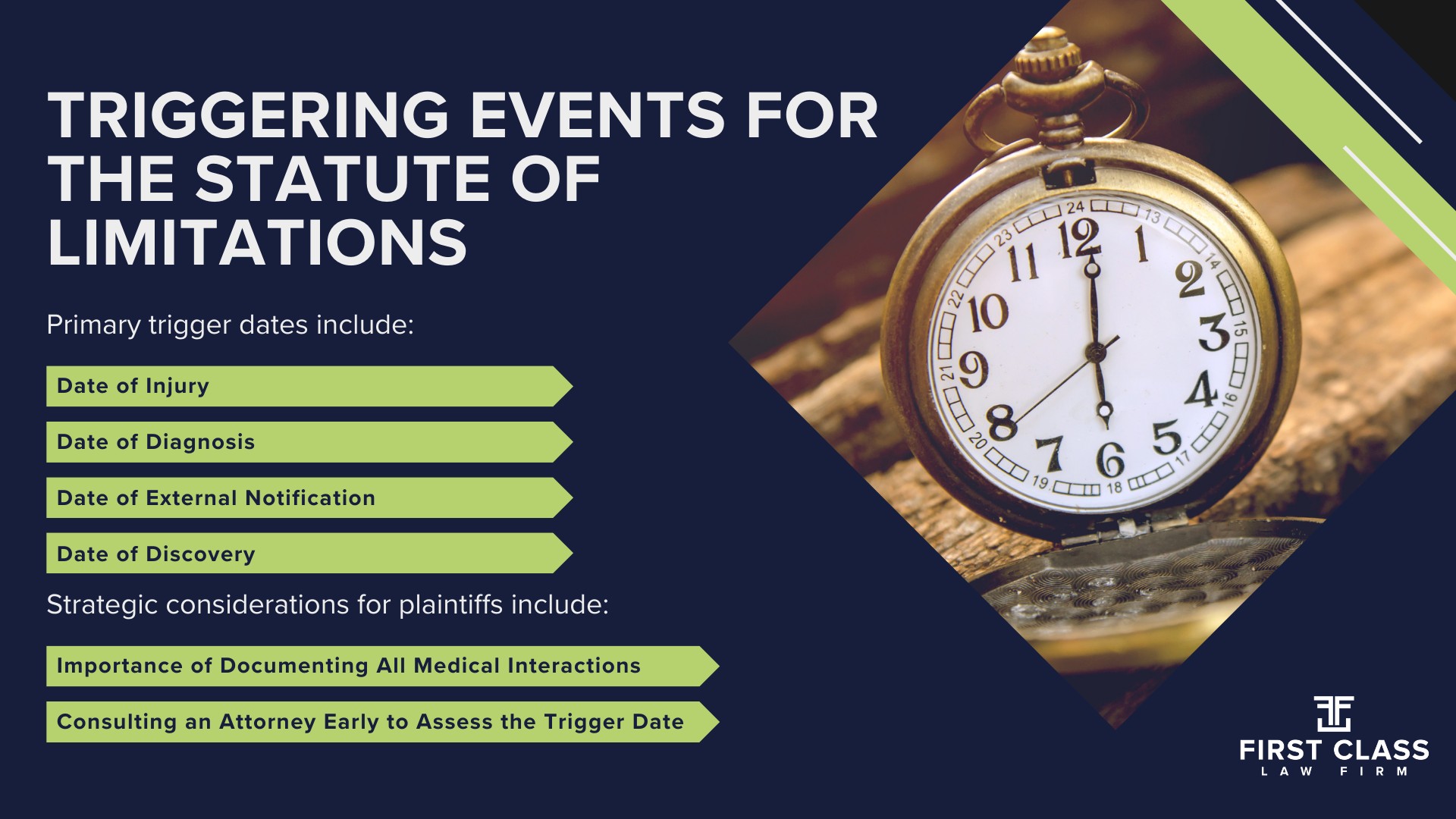
Primary trigger dates include:
Strategic considerations for plaintiffs include:
In medical malpractice cases filed in Georgia, plaintiffs must meet a preliminary evidentiary requirement at the beginning of litigation.
Known as the Affidavit of Merit, this procedural step is mandated by Georgia law and is crucial in screening out claims that lack expert support.
An Affidavit of Merit is a sworn written statement prepared by a qualified medical expert.
Its purpose is to confirm, under oath, that the expert has reviewed the plaintiff’s case and believes there is factual and professional support for the allegation that the defendant’s conduct failed to meet the relevant standard of care.

This requirement is not unique to medical malpractice; it also applies in other types of professional negligence cases.
However, in medical malpractice specifically, it acts as an early legal review point before litigation advances.
Under Georgia law, the affidavit must be filed at the same time as the initial complaint or within a short extension period if granted by the court.
Failing to file the affidavit as required may lead to procedural dismissal.
This rule aims to prevent unsupported claims from entering the judicial system and to show that a qualified professional has reviewed the facts before legal action is taken.
The relevant statute, O.C.G.A. § 9-11-9.1, specifies the requirements and timing involved.
The statute allows for limited exceptions; however, compliance is mandatory in most cases.
The expert providing the affidavit must meet specific criteria.
Specifically, they must be a licensed healthcare professional actively practicing in the same or a significantly similar field as the defendant.
Furthermore, the expert must show familiarity with the relevant standard of care.
This ensures the affidavit is based on credible, field-specific medical judgment.
Courts may closely scrutinize the qualifications of the affiant.
If the expert lacks sufficient experience or relevance to the specialty, the affidavit may be challenged or excluded, which could weaken the plaintiff’s case at the preliminary stage.
Failing to file a valid Affidavit of Merit can lead to serious procedural consequences.
Usually, the result is the dismissal of the lawsuit, often with limited or no chance to refile.
Although courts might permit corrections in very specific situations, Georgia law offers little tolerance for noncompliance.
Due to these strict rules, it is crucial for plaintiffs and their attorneys to secure an appropriate expert and prepare the affidavit by the law well before filing the complaint.
A mistake or oversight at this stage could prevent the claim from being pursued.
The statute of limitations in Georgia medical malpractice cases varies depending on the situation.
The type of alleged malpractice can determine when the filing deadline starts and if any exceptions or alternative trigger dates apply.
While the standard two-year statute of limitations under O.C.G.A. § 9-3-71 serves as the default, each category of malpractice may have unique timing considerations.
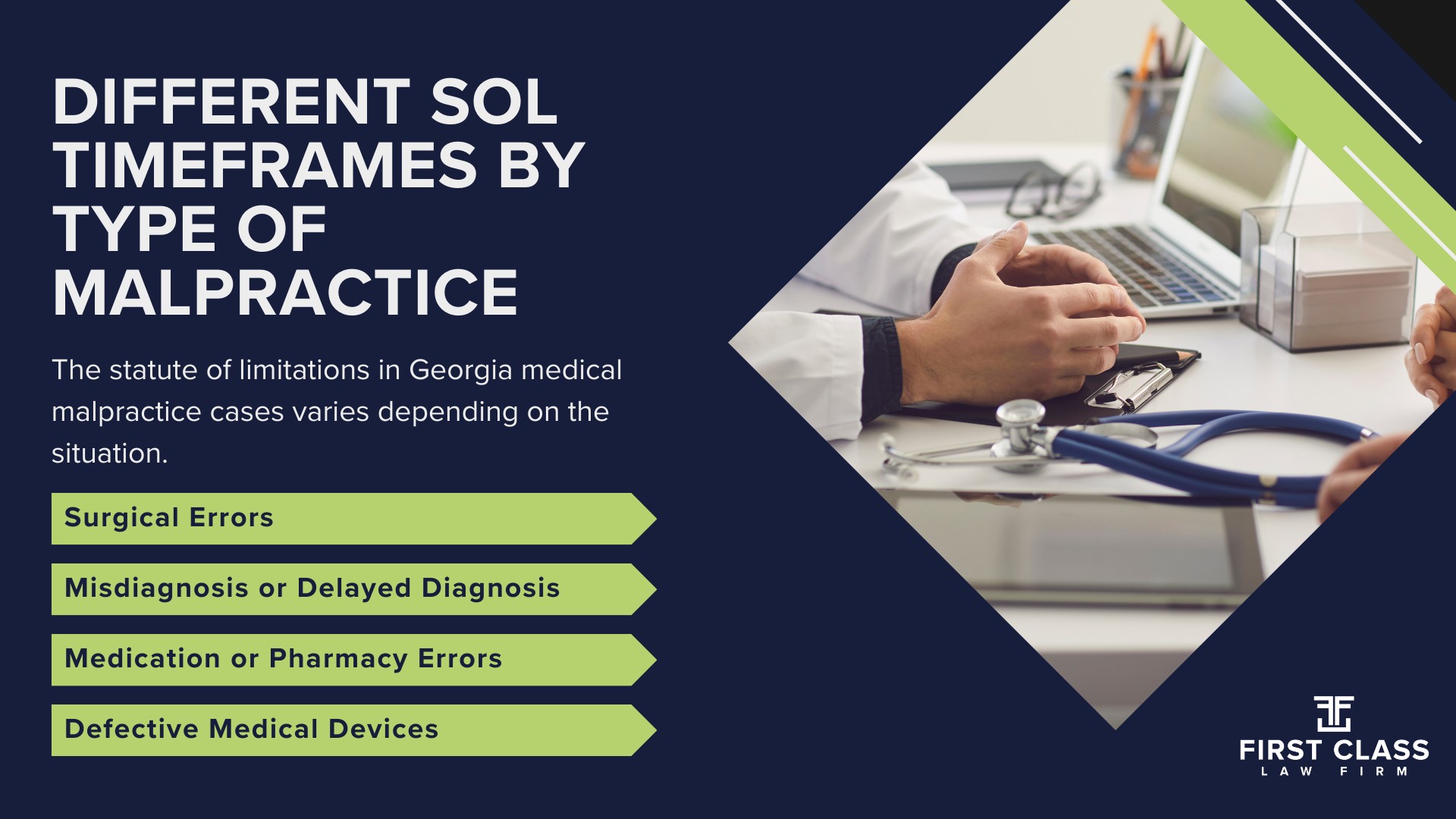
In most surgical error cases, such as wrong-site surgery, procedural mistakes, or complications caused by negligence, the harm is clear either during the procedure or shortly afterward.
As a result, the statute of limitations typically begins on the date of the surgery or when the injury is first identified after the surgery.
An exception may apply if a foreign object is left in the body, allowing one year from the date of discovery to file a suit, subject to the five-year statute of repose.
When a condition is misdiagnosed or a correct diagnosis is significantly delayed, identifying the trigger date can become more complicated.
Sometimes, the statute of limitations starts either on the date the proper diagnosis is made or when the patient reasonably should have discovered the error.
However, in Georgia, the “subsequent injury” principle is applied narrowly, and most cases are still governed by the standard two-year period from the date of the alleged negligent act, unless a qualifying exception applies.
Errors in prescribing, dispensing, or administering medication, such as giving the wrong dosage or an incorrect drug, are usually identified at or near the time they happen.
In these situations, the statute of limitations typically starts on the date of the administration or dispensing. If the error causes an injury that appears later, the starting date might still be the original incident unless a legal exception can be proven.
Claims involving defective medical devices, such as implants or prosthetics, may involve product liability principles.
In such cases, the statute of limitations can be affected by the date of the medical procedure, when the defect was discovered, or the issuance of a recall notice.
While a recall or safety advisory does not automatically extend the filing period, it may serve as evidence of when a patient should have reasonably been aware of the potential defect.
These cases may also be impacted by Georgia’s product liability statutes, which have their own limitations and repose periods.
While Georgia law sets strict deadlines for filing medical malpractice claims, certain exceptions and tolling provisions can extend the statute of limitations under specific circumstances.
These rules are applied narrowly and depend heavily on the facts of each case.
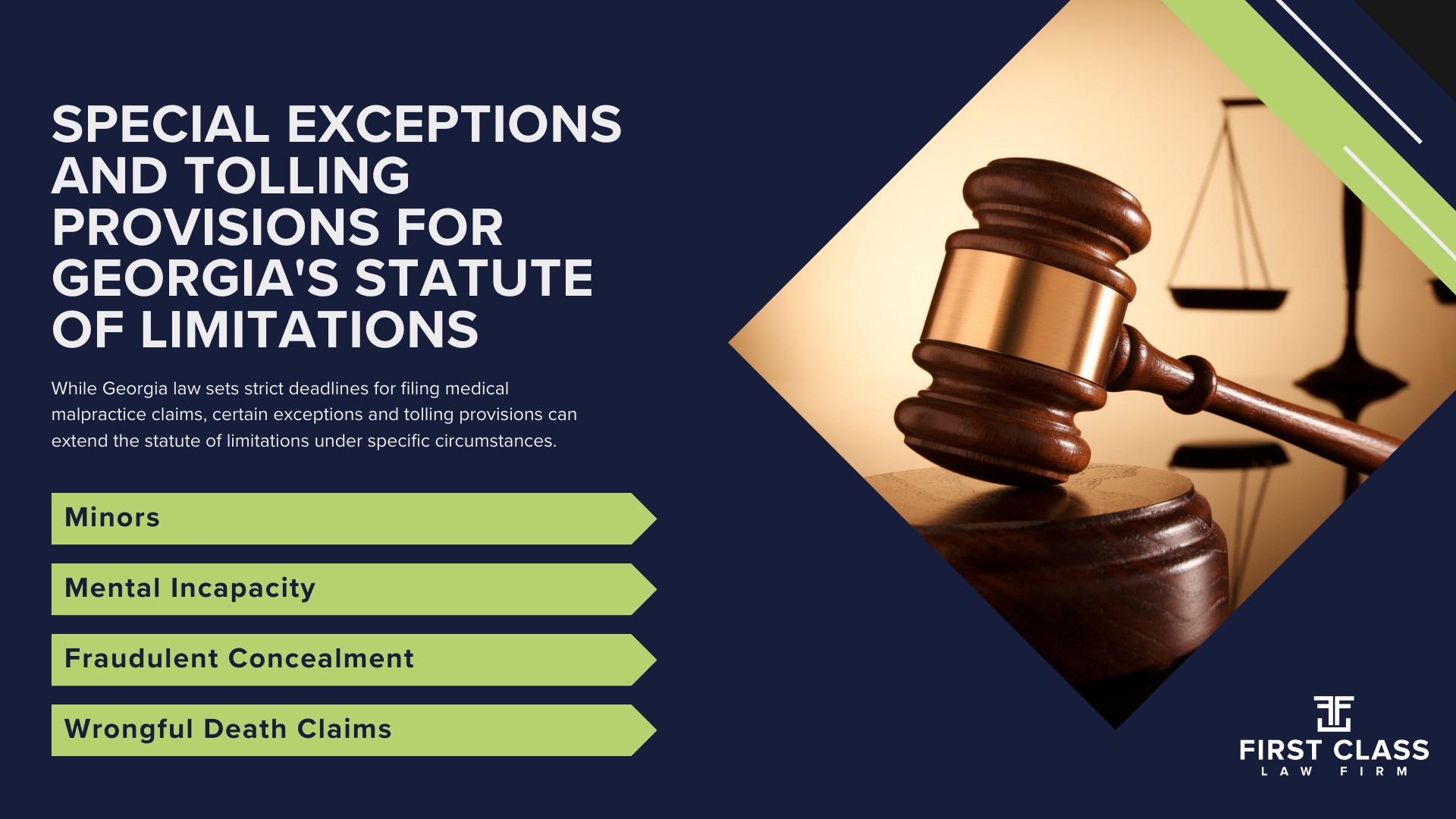
Under O.C.G.A. § 9-3-73, special timing rules apply to medical malpractice claims involving minors.
For injuries that happen before a child’s fifth birthday, the statute of limitations is paused until the child turns five.
This means that a lawsuit must be filed no later than the child’s seventh birthday.
These provisions are designed to ensure that young children, who are unable to act on their own, are not denied the opportunity to seek justice due to their age.
Georgia law allows tolling for individuals who are legally incapacitated when their cause of action begins.
This includes people who are legally found to be incompetent due to intellectual disabilities or mental illness.
In these cases, the statute of limitations does not start until the legal disability is lifted.
Once competency is regained, the individual has the same amount of time to file a lawsuit as any other plaintiff under the usual statute of limitations.
Suppose a healthcare provider or facility intentionally conceals malpractice by hiding facts, altering records, or otherwise preventing the injured party from discovering the wrongdoing.
In that case, the statute of limitations may be extended.
Fraudulent concealment requires intentional misconduct and can be difficult to prove, but when proven, it can give a plaintiff extra time to file a claim that would otherwise be barred.
In cases where alleged medical malpractice results in death, the statute of limitations may be based on the date of death rather than the date of the negligent act or injury.
This distinction is important because it can result in a different filing deadline from the underlying personal injury claim, and the timelines for the wrongful death lawsuit and any related estate claims may not always align.
Georgia’s laws regarding medical malpractice filing deadlines are often misunderstood, which can result in missed opportunities to pursue a claim.

Below are common misconceptions and the actual legal facts under Georgia law.
While some states apply a broad discovery rule, Georgia’s law is much more limited.
The general rule states that the two-year statute of limitations starts on the date of injury or death, not when the injury is discovered.
Exceptions, such as finding a foreign object left during surgery, are narrowly and clearly defined by law.
In most cases, delayed awareness of an injury will not extend the filing deadline beyond the two-year limit. In all situations, the five-year statute of repose acts as a firm cutoff.
The severity of an injury does not affect the applicable deadlines.
Whether the harm was minor or life-threatening, Georgia law requires claims to be filed within the designated statutory periods.
Serious injuries may impact the potential value of a claim, but they do not change the statute of limitations or statute of repose.
Filing deadlines in Georgia are linked to specific legal events—such as the date of injury, the date of diagnosis in certain misdiagnosis cases, or the discovery of a qualifying hidden injury—not personal readiness.
The law rarely allows flexibility based solely on a plaintiff’s circumstances. Waiting until you feel ready to act may cause your right to pursue a claim to expire.
At First Class – The Atlanta Personal Injury Law Firm, we understand the devastating impact of medical malpractice on victims and their families.
Holding negligent healthcare providers accountable requires legal experience, medical knowledge, and a commitment to justice.
Our firm is dedicated to helping injured patients recover compensation for their medical expenses, lost wages, pain and suffering, and other damages caused by negligent care.
With a deep understanding of Georgia medical malpractice laws, we build strong cases backed by expert testimony and extensive evidence.
Whether you are dealing with a misdiagnosis, surgical error, birth injury, or another form of medical negligence, we are here to fight for you.

If you or a loved one has suffered due to a medical provider’s negligence, don’t wait to seek legal guidance.
Contact First Class – The Atlanta Personal Injury Law Firm today for a free consultation.
We will review your case, explain your legal options, and help you pursue the justice and compensation you deserve.
This content is provided solely for educational purposes and should not be considered legal advice. Each medical malpractice case is unique, and filing deadlines can vary depending on factors such as jurisdiction, claim type, and individual circumstances.
To receive advice tailored to your specific situation, contact a qualified attorney promptly to review your rights and explore your legal options.
Determining when the statute of limitations applies in a Georgia medical malpractice case is not always straightforward.
The time period can depend on the nature of the medical treatment, when the injuries became apparent, and whether certain exceptions are involved.
In most cases, the statute of limitations applies from the date the injury occurred or the date a death occurred due to malpractice.
However, in limited situations (such as when a foreign object is discovered years later) the start date may shift to the point of discovery.
Because these rules are strictly enforced, timely action is essential to avoid losing the right to bring a claim.
Reviewing your medical records, treatment history, and other evidence is an important step, but only experienced legal counsel can accurately determine when your filing deadline began.
An attorney can evaluate your circumstances, identify whether exceptions apply, and calculate the exact time period available to file your lawsuit.
In Georgia, courts strictly enforce filing deadlines for medical malpractice claims.
Even a short delay can lead to the claim being dismissed, regardless of how serious the injury is.
That’s why it’s important to seek legal advice and pursue legal action as soon as possible.
Yes.
According to Georgia law, an Affidavit of Merit from a qualified medical expert is generally required when a complaint is filed, regardless of how clear the alleged negligence may seem.
This affidavit must state that the expert has reviewed the facts and believes the care fell below the accepted medical standard.
Generally, the same statutes of limitation and repose apply to both hospitals and private healthcare providers in Georgia.
However, additional procedural requirements may apply depending on the defendant’s status, such as whether they are a government-owned facility.
Georgia law recognizes limited circumstances where the statute of limitations may start at the time of discovery rather than the date of the negligent act.
For example, in cases involving a foreign object left in the body, you may have one year from the discovery date to file a claim.
In most other cases, the standard two-year period applies, and the five-year statute of repose may also limit it.
When a medical malpractice claim is successful, victims may recover compensation for a variety of losses tied to the injuries caused.
These damages are intended to address both financial costs and the personal impact of the malpractice.
Common recoverable damages include:
These categories ensure that the full scope of harm is considered when evaluating a malpractice claim.
Our firm specializes in personal injury cases across the state of Georgia, working on a contingency fee basis to ensure the best possible service for each client.
Click below to get a free, instant case evaluation and find out if you qualify for legal action immediately.
Would you like our help?
Atlanta Personal Injury Law Firm specializes in personal injury cases across Georgia, including motor vehicle accidents, premises liability, catastrophic injuries, and wrongful death claims. Our experienced Georgia injury attorney works on a contingency fee basis, ensuring you only pay legal fees once we secure your settlement or verdict.
Contact our experienced legal team by phone or visit our website for a instant case evaluation. Trust Atlanta Personal Injury Law Firm for dedicated legal representation in Georgia.
Our firm specializes in personal injury cases across the state of Georgia, working on a contingency fee basis to ensure the best possible service for each client.
Click below to get a free, instant case evaluation and find out if you qualify for legal action immediately.
Would you like our help?
Disclaimer: “Don’t Pay Unless You Win” and similar language refers only to fees charged by the attorney. Court costs and other additional expenses of legal action usually must be paid by the client. Contingent fees are not permitted in all types of cases. This website is an advertisement. Nothing is meant to be taken as legal advice or to give the impression that an attorney-client relationship has been created. Please speak with a legal professional.